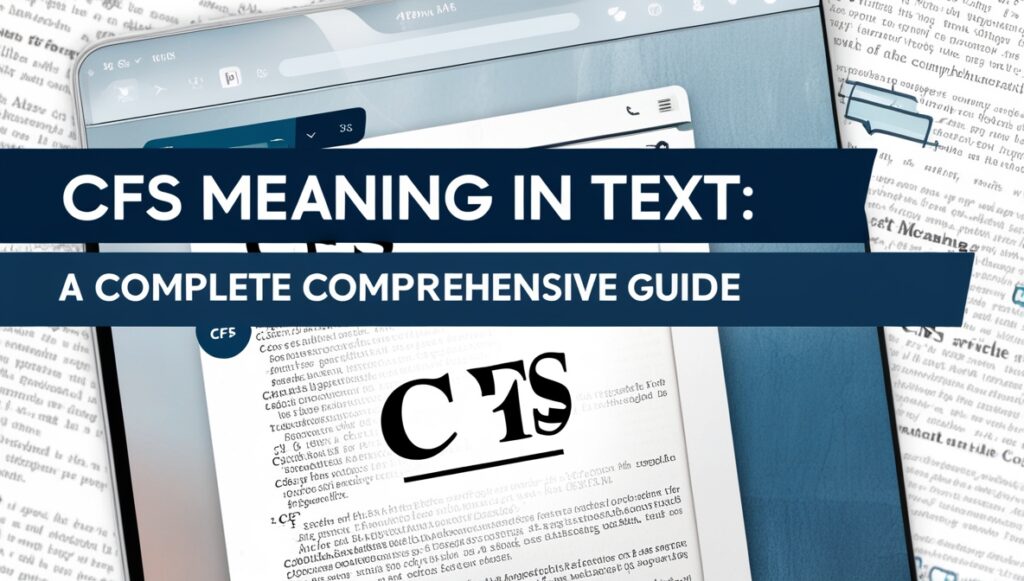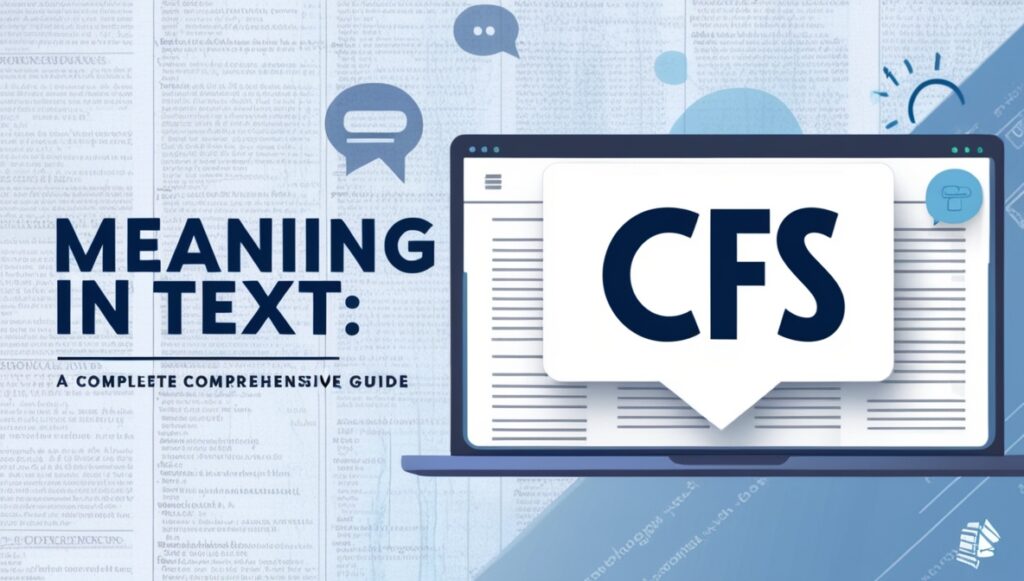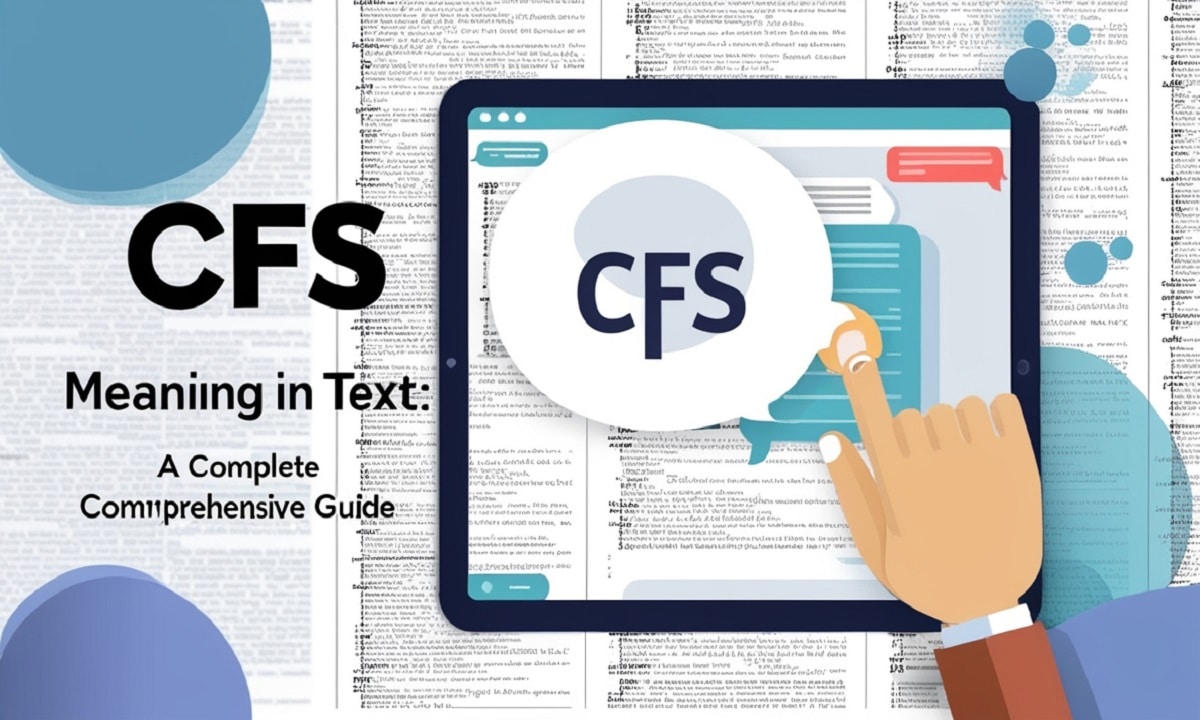Digital communication runs on speed and shortcuts. That’s why acronyms and abbreviations dominate texting, gaming, and social media. Among them, the CFS meaning in text creates confusion because it holds multiple interpretations depending on context.
This guide breaks down every angle. You’ll learn its definition, usage in different contexts, examples in real life, and even when it might sound offensive. By the end, you’ll understand exactly what does CFS mean and how to respond when you see it.
Definition of CFS in Text
The CFS abbreviation holds several meanings in online chats and everyday slang. The most common meanings are:

- “Can’t Find Sh*t” – a piece of blunt internet slang often used when something is lost.
- Chronic Fatigue Syndrome (CFS) – a recognized medical condition with roots in the 1980s.
- Call for Support – a gaming acronym or sometimes used in military communication.
- Certified Food Scientist – a professional title used in science and food industries.
When people ask about CFS in texting slang, the first interpretation is usually “Can’t Find Sh*t.” However, the correct semantic meaning always depends on who is speaking and in what situation.
Origins and Background
The background and history of CFS slang show interesting patterns:
- Early 2000s: “Can’t Find Sh*t” gained traction in US/UK chat rooms and text messages.
- 1980s: The medical term Chronic Fatigue Syndrome became recognized in healthcare circles.
- 2000s gaming culture: “Call for Support” appeared in multiplayer titles as fast shorthand.
- Professional fields: The Certified Food Scientist credential was formalized by the Institute of Food Technologists (IFT).
This overlapping evolution created the wide range of semantic entities tied to the same CFS abbreviation.
Usage in Different Contexts
The usage of CFS shifts drastically depending on the domain. Context is everything.
Texting & Social Media
- CFS slang in texting often means “Can’t Find Sh*t.”
- It appears in memes, sarcastic posts, or quick messages.
- Example: “Bro, CFS my charger again.”
Gaming Communities
- In online gaming, players use CFS as “Call for Support.”
- It’s a quick signal in group play or raids.
- Example: “CFS mid lane now!”
Professional and Medical Settings
- In workplaces, CFS might mean Certified Food Scientist.
- In healthcare discussions, it refers to Chronic Fatigue Syndrome.
- These uses are formal and unrelated to internet slang.
Examples of CFS in Real Conversations
Here are direct, practical uses of CFS slang across different chats:
| Context | Example Sentence | Meaning |
|---|---|---|
| Text Message | “Ugh, CFS my wallet this morning.” | Can’t Find Sh*t |
| Social Media Post | “CFS my motivation lately 😂.” | Can’t Find Sh*t |
| Gaming Chat | “CFS at base, regroup fast.” | Call for Support |
| Workplace Email | “Meet our new hire, a Certified Food Scientist (CFS).” | Certified Food Scientist |
| Medical Forum | “Living with CFS is exhausting.” | Chronic Fatigue Syndrome |
Common Misconceptions
Misunderstanding online chat terms is easy. Some common misconceptions include:

- Believing CFS only means one thing. In reality, it varies widely.
- Confusing CFS slang with Chronic Fatigue Syndrome, leading to awkward misunderstandings.
- Thinking it’s always offensive. While blunt, “Can’t Find Sh*t” is not inherently harmful.
Related Acronyms & Alternatives
Other social media slang behaves in a similar way to CFS.
- SMH (Shaking My Head) – expresses disbelief or disappointment.
- IDK (I Don’t Know) – a standard texting abbreviation.
- OMS (Oh My Stars) – less common but used in lighthearted chats.
Alternatives to CFS slang:
- Instead of “Can’t Find Sh*t,” some write CFB (Can’t Find Anything) in polite chats.
- In gaming, alternatives include SOS (Save Our Souls) or simply Help!
How to Respond to CFS
When someone uses CFS chat slang, your reply depends on the context.
- Texting/social media: Respond humorously or helpfully.
- Example: “Check your bag again 😂.”
- Gaming context: Take action fast.
- Example: “On my way mid lane!”
- Professional/medical context: Respond seriously.
- Example: “Yes, I read the latest CFS medical research.”
Tip: Always confirm the meaning before assuming. Miscommunication happens easily in texting slang.
Regional & Cultural Variations
CFS meaning can shift based on geography and culture.
- In the US/UK, “Can’t Find Sh*t” dominates slang origin and is widely understood.
- In professional circles worldwide, Certified Food Scientist is common.
- In Asian gaming communities, “CFS” may carry different abbreviation context, sometimes replaced with local terms.
Cultural variation highlights why context is critical in decoding internet slang.
Is CFS Offensive or Harmless?
The slang meaning of CFS contains the word “sh*t,” which can offend in formal spaces.
- Casual texting: Usually harmless, considered a light form of frustration.
- Professional communication: Avoid using it to prevent sounding unprofessional.
- Generational divide: Younger users normalize slang, while older users may find it rude.
“Slang words like CFS are harmless in private chats but risky in public settings.”
FAQs
What does CFS mean in texting?
- It usually means Can’t Find Sh*t, a popular texting slang abbreviation.
Is CFS always slang?
- No. It also stands for Chronic Fatigue Syndrome, Call for Support, and Certified Food Scientist.
Where did CFS slang start?
- It emerged in the early 2000s from US/UK text culture and urban dictionary entries.
Is CFS offensive?
- Only mildly. It’s informal, so avoid it in professional or public contexts.
What are alternatives to CFS?
- Use phrases like CFB or acronyms like SOS depending on context.
Conclusion
The CFS meaning in text is not a one-size-fits-all answer. It shifts across slang, gaming, medical, and professional fields. Knowing the definition and meaning, recognizing the usage in different contexts, and checking for regional and cultural differences will help you avoid misunderstandings.
Next time someone drops CFS in texting slang, you’ll know whether they mean “Can’t Find Sh*t”, a serious medical abbreviation, or even a gaming acronym like “Call for Support.” Context is king.

